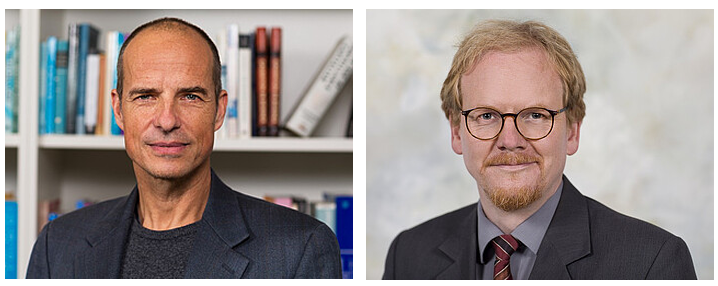€4 Million Grant for Philosophical Research on the Credibility of Science
A project led by philosophers Mathias Frisch and Torsten Wilholt (Institut für Philosophie at Leibniz Universität Hannover) on science and trust has received a 4,020,000 million euro grant from the German Research Foundation (DFG).

Mathias Frisch, Torsten Wilholt
The project, “Social Credibility and Trustworthiness of Expert Knowledge and Science-Based Information” (SOCRATES), “aims to investigate the philosophical preconditions that are relevant to trust in knowledge and scientific credibility in general [and the] processes through which scientific expertise can be undermined,” according to an announcement from the DFG. A press release from Leibniz Universität Hannover, where the project will be based, says:
SOCRATES intends to tackle the challenge of understanding how science can continue to serve as a source of shared knowledge that not only enjoys trust but actually earns it. The group will investigate philosophical requirements relevant for trust in science. As a forum for exchange between researchers from philosophy, sociology, communication and media studies as well as other disciplines, SOCRATES aims to provide a comprehensive and coherent philosophical approach to scientific credibility and trust in science.
The grant, which will support the project for four years, will in part be used to fund senior and postdoctoral fellowships, among other things.



Frankly, I think there are many other questions that are more important than the one that has received this stunningly large award. For instance: How are we to determine when human life begins? But perhaps the current project of SOCRATES will be interpreted so broadly that it will include such a question—and other very challenging and stubbornly difficult questions.
Yes, there may be more important questions (to philosophers), but that’s not how research funding works, which typically also cares about practical impact.
It may be worth €4M to those funders (who depend on taxpayers) to restore trust in science, but I have a hard time imagining any national funding agency spending that much money to answer a contentious philosophical question that’s unlikely to settle the matter and very likely to be weaponized in abortion and other bioethical debates. Maybe the Templeton Foundation would be interested, but they’re not a national funding agency.
I’m not saying that’s how it should be, only that’s how it is.
Of course there are many important questions in philosophy, but I would think that this particular one is in fact very important, much more so than a mere four million euros can do to make progress on it.
The issue isnt with the image of science per se but the seductive power of those seeking to undermine it.
We’ve seen how this goes down in the last 2 years. Personally I rank it among the most pressing social issues and one that philosophy ought to tackle; at least for those wishing to interface with real people.
Thanks for the shout out, Justin! Please allow me a little clarification. It is true that we will keep offering postdoctoral fellowships (for the duration of up to one year), and we will certainly publish a first call for them soon. (The project will not properly start until the fall.) The ad on Philjobs that you kindly linked to is for a slightly different position, namely a 4-year postdoctoral position within the project. Of this type of position, we can only offer this single one.